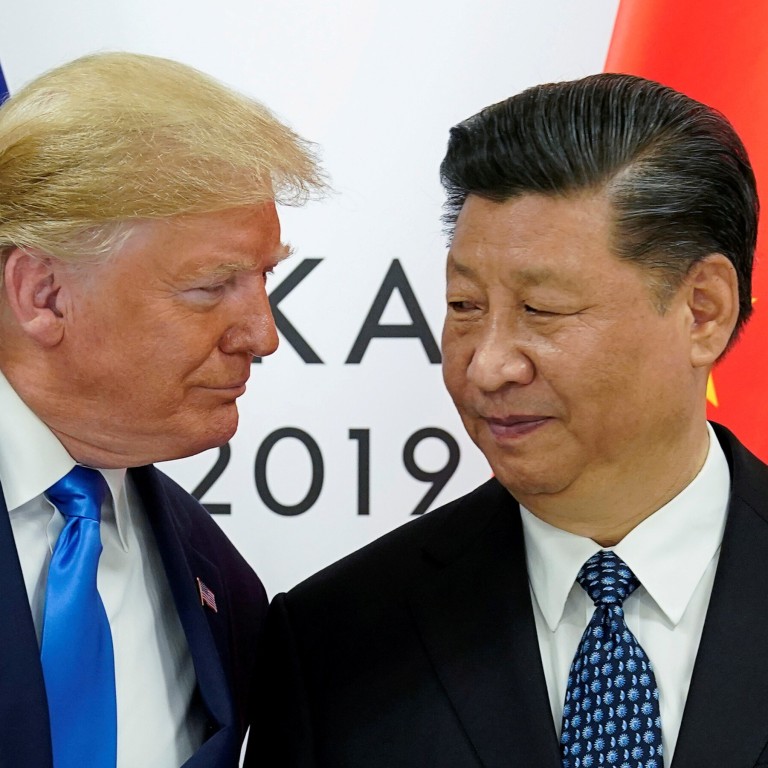
Coronavirus: China and US in ‘new Cold War’ as relations hit lowest point in ‘more than 40 years’, spurred on by pandemic
- US-China relations have nosedived to their lowest point in decades, ex-officials on both sides say
- Donald Trump has threatened to scrap the phase one trade deal and increase tariffs, while Chinese media have stepped up attacks on US political figures
A dramatic deterioration in US-China relations in recent days has convinced current and former government advisers on both sides that bilateral ties have plummeted to their lowest point in decades.
Over the past week, the Trump administration has threatened to scrap the phase one trade deal and increase tariffs on China, backed tough new export controls for Chinese firms buying American tech products, and continued to push theories claiming the coronavirus was man-made and leaked from a laboratory in the city of Wuhan.
The United States and China are actually in the era of a new Cold War
Last week, a video mocking America’s handling of the coronavirus, entitled “Once Upon a Virus”, was widely shared among hawkish foreign ministry officials after it was released by official news agency Xinhua.
“The United States and China are actually in the era of a new Cold War,” said Shi Yinhong, an international relations professor at China’s Renmin University and an adviser to China’s State Council, effectively the country’s cabinet.
While the rhetoric about a “new Cold War” is a common talking point in Washington, it is used less frequently in public by Chinese advisers and scholars. After all, the original Cold War spelt the end of the Soviet Union and left the United States victorious.
But the nosedive in relations in recent weeks has lent the comparison mainstream acceptance, promoting it from the fringes of the Trump administration to a reality accepted by many.
Reuters reported on Monday that a leaked Chinese government document said global anti-China sentiment is at its worst point since 1989, when Beijing brutally cracked down on the Tiananmen Square protests.
In the past, you could always find pro-China voices on the US political spectrum, but there is no such voice in the Trump administration
Yu Wanli, deputy director at the Lian An Academy think tank in Beijing, agreed that US-China relations were at their lowest point since the Tiananmen crackdown.
“I had always been optimistic about the US-China relationship until recently. In the past, you could always find pro-China voices on the US political spectrum, but there is no such voice in the Trump administration,” Yu said, pointing to a recent Pew poll of 1,000 Americans which found that 66 per cent of respondents held an unfavourable view of China.
Chen Zhiwu, director of the Asia Global Institute at Hong Kong University, said the situation was the worst he had seen in more than 40 years studying US-China affairs.
“Even back in 1989, the underlying sentiment by Americans towards China was not that bad. It is much worse and much more deeply rooted,” Chen said. “China can stop using diplomatic channels and spokespeople to further inflame the rhetoric, because this kind of effort just does not help.”
The atmosphere is even icier now than during the low points of 2018 and 2019, when US President Donald Trump slapped tariffs on Chinese goods in an effort to force structural changes to the world’s second largest economy.
I think that people absolutely need to take it seriously
Throughout the US-China trade negotiations, Chinese state media outlets were careful to avoid direct criticism of Trump, while the US leader avoided criticising his Chinese counterpart Xi Jinping.
But that sense of deference in the Chinese media disappeared months ago, with Xinhua referring to the US outbreak as the “Trump pandemic” in a tweet in March, followed by a threat to engulf America “in the mighty sea of coronavirus” by blocking exports of vital medical equipment.
A former Trump administration official, speaking anonymously, said that the Xinhua report was “perceived as a direct threat” by White House officials, adding that “the Chinese press is read quite closely” and that the shift in rhetoric will have been noted.
Trump, for his part, has variously indulged in and refrained from using the term “China virus”, but has stopped short of directly criticising Xi.
“I think that people absolutely need to take it seriously. I don’t know that it’s imminent, but I do think that it will be under consideration,” said Willems, adding that he would prefer the US government use targeted penalties over “blanket tariffs” against anyone in China perceived to have been involved in a cover up or hoarding medical supplies.
Willems said there had been “a noticeable increase in hostile words” but the recent trend was a “significant acceleration of an existing trajectory, rather than a completely new one”.
“But it does worry me – where does this lead?’ he added. “We have to be realistic and say we are on a Cold War footing right now.”
As the US election in November grows closer, analysts are expecting the downward spiral to worsen.
“Trump was previously working in the knowledge that the phase one trade deal was going to be an electoral asset, but the pandemic has upset the apple cart,” said Stephen Olson, a former US trade negotiator, now with the Hinrich Foundation.
“Now striking a deal with China does not look politically beneficial [Democratic candidate] Joe Biden senses an opening, that Trump could be portrayed as being soft on China.”


